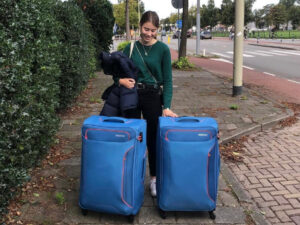Top tips for international students moving to Scotland

By Eva, Spanish and American raised in the Netherlands, studying MSc Management
Moving to a new country can seem like a daunting experience. However, you will soon realise it is one of the most rewarding and exciting opportunities! I moved from the Netherlands to Scotland four years ago for my undergraduate degree, and although I was nervous at first, I am very glad I persisted and wouldn’t change that decision for the world. Here are a few things I wish I had known before coming to university in Scotland as an international student:
Travel and commuting
There are a few things you should know about travel and commuting in Scotland that might make your arrival a little bit smoother.
Travelling by train
First of all, for travel by train, I recommend purchasing a railcard (either the 16-25 or 26-30 railcard). It costs £35 for the year or £70 for three years and gives you a third off train travel throughout the Scotland, England, and Wales.
Travelling by bus
The Young Scot Card is a government scheme that offers discounts to young people living in Scotland and allows everyone living in Scotland aged 21 and under to travel by bus for free.
I would recommend applying for the Young Scot Card as soon as possible because it will save you a lot of money on travel. It’s also beneficial if you want to discover more of Scotland, as you can take the bus to cities like Glasgow, Stirling or even further afield to towns like Aviemore and Inverness in the Highlands!
But don’t worry if you’re over 22 – there are other discounts you can take advantage of. For travel within Edinburgh, you should consider buying a Ridacard from Lothian Buses, the main bus provider in Edinburgh. These season tickets give you unlimited travel on buses in the Lothian network, as well as on Edinburgh Trams. Ridacards are available for different lengths of time, from a week up to a year. Students can get a discount (around 12% off) when they buy a Ridacard by presenting their matriculation card. For more information, you can check the Lothian Buses website.
Lastly, for travel by bus outside of Edinburgh you can use Totum, a discount app and card which gives you 10% off traveling with Megabus. Megabus is the main bus company for travel to other cities like Glasgow, Stirling, Dundee, etc.
Apps
There are a few apps that might come in handy during your time in Scotland. I’ve listed some of the ones I use most:
University apps
During your time at university, you’ll be using several apps frequently, such as Teams, Outlook, and Blackboard (Learn), the University’s Virtual Learning Environment. The University of Edinburgh Events app is also great for keeping track of events, such as those during Welcome Week.
Facebook and Messenger
For some, these might seem obvious, but I wasn’t accustomed to using Facebook and Messenger frequently before coming to university. I soon realized that a lot of communication from the university and course group chats were formed on Messenger, so it might be worthwhile to create an account if you haven’t already.
Supermarket apps
Depending on where you decide to shop for groceries, you can take advantage of discounts and deals through their apps. For example, I recommend getting a Tesco Clubcard, which gives you discounts on many items, as well as the Lidl app, which provides weekly deals.
Most UK supermarkets have an app of some form that either gives loyalty discounts or allows you to collect points.
Travel apps
For travel, I recommend downloading the Scotrail app, where you can purchase train tickets ahead of time. Trainline is also useful for train travel and offers additional discounts.
The Lothian Buses/Edinburgh Trams and Transport for Edinburgh apps gives you access to the bus and tram schedules and are often more effective than using Google Maps when relying on public transport.
Shopping/stores
Another big change when moving abroad is where to do your shopping. Luckily, there are many different options.
Throughout the city, there are many Tesco Express and Local Sainsbury’s stores, which are convenient for quick food shopping trips. However, these tend to be a bit more expensive than the larger stores.
To save money, I recommend shopping at Lidl, which is close to the University Central Area, or opting for home delivery for your groceries. This is a great option if you are living in student accommodation or share a flat with other students. This way, you can share the delivery fee and schedule your groceries to be delivered directly to your door!
For household items, I recommend checking Poundland, Ikea or Amazon (which offers Amazon Prime for students at a discounted price). Other stores like Argos and TK Maxx are also great places to find bargains on homeware, clothes, and toiletries.
My personal tip would also be to check out charity shops. These are stores that sell used items to raise money for their parent charities, and you can often find a lot of practical items at a low price. I have found that the majority of charity shops are located on Morningside Road and Newington Road.
Bank account
Managing your finances from abroad might be easier with a UK bank account. I opened an account as soon as I turned 18, which has made paying rent, utilities, and other expenses in the UK much simpler. There are many different options depending on your preferences and on the eligibility requirements. Some banks offer student discounts when you open an account with them and E-banks are also a great option. For more information, check out our webpage on UK bank accounts:
View information on how to open a bank account in the UK
SIM card for your phone
When moving to the UK, you might want to consider getting a UK phone number. Some companies require a UK phone number for online orders and other services.
Personally, I wanted to keep my international phone number since it was connected to everyone back home and to my WhatsApp. A great option I found was using e-SIM cards. If your phone is compatible with e-SIMs, you can buy them from providers like Lycamobile, EE, Vodafone and others.
It allows you to have multiple SIM cards on your phone and switch between them easily. For me, this meant I could keep WhatsApp on my international number while using my UK number for calls and texts.
If you prefer to have a physical UK SIM card, there are many great providers to choose from, such as GiffGaff, Tesco Mobile, Vodafone, and more.
Packing
When you’re traveling to university from abroad, you often have limited packing space. I found some items to be crucial, while others went unused.

Kitchen accessories
Bring cutlery, but not too much! Since most dorms and flats don’t have dishwashers, you’ll be washing a lot by hand, so you don’t need many utensils and plates. I use Tupperware a lot, especially if I’m cooking meals for the week. While it can be easily purchased once you get to Edinburgh, having some on hand for your first few days might be handy.
Warm clothes
Make sure to pack enough warm clothing. I made the mistake of adding in tons of summer clothes, which ended up being unnecessary due to the Scottish weather- yes, even in summer!
Plug/electrical adapters
If you’re coming from abroad, pack one or two adapters for UK plugs. You can also buy them in Edinburgh or at the University shop, but it’s handy to have them during your first days of settling in.
Stationery
I would recommend not worrying too much about stationery – you can buy it once you arrive, which will save you some space while packing. However, make sure to bring your laptop!
A laundry bag
If you’re staying in student accommodation, you’ll likely need to carry your laundry to the laundromats, which is much easier with a handy laundry bag.
Personal belongings
I brought a lot of photos – of my family, friends, hometown, and more – to decorate the walls in my room or to look through if I was feeling a bit homesick.
View list with more information about what to pack for Edinburgh
Make the most of your time at university!
The last point I would like to highlight is that your time at university is a truly unique and transformative experience. Once you have all of the practical tasks figured out, you can really start to enjoy everything Scotland and the University have to offer.
Take day trips to other cities, explore new types of food and traditions, and immerse yourself in student life by joining societies and sports clubs. Before you know it, you’ll have many friends from all across the world to share this adventure with. And remember, if things aren’t going as smoothly as you’d like, don’t hesitate to reach out – the University has many resources available to support you.



